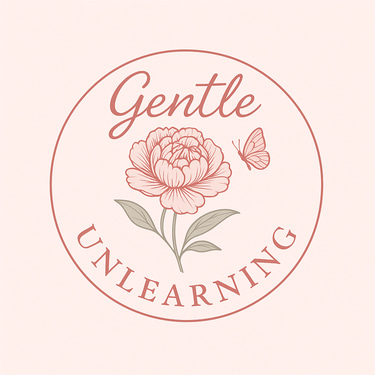The Childhood Code: Watch, Please, Survive
Be good, be quiet, be liked. That was the unspoken rulebook.
AWARENESS


Why Approval-Seeking Was Never About Being Good.
It Was About Staying Safe
If you’ve ever struggled to make decisions without asking someone else,
If you overthink whether you’re being liked, understood, or "too much"...
If you feel guilty saying no, or anxious when you disappoint people...
This isn't a personality flaw.
It’s a survival strategy you never got to outgrow.
Because school didn’t teach us how to develop our own sense of self.
Our own agency.
Our own voice.
Our own choice,
Our ownership over our lives.
Systems taught us
how to please.
How to perform.
How to behave.
You were rewarded for following rules, not for asking questions.
You were praised for being obedient, not for being honest.
You were told who to be and your job was to become that person.
And Most of all taught us that we can have it our way when we became 18.
What a lie.
Now you're an adult, and you're exhausted.
You're living a life that looks good but doesn’t feel good.
You don’t know what you want.
Only what will make others proud.
That confusion? That burnout? That fear of disappointing others?
It started long before you had the words to understand or name it.
When you're little, approval isn't optional.
It's your lifeline.
Children between the ages of 3 and 12 aren't thinking about values or integrity.
They're learning how to survive in their little communities and survival looks like this:
“Did I do it right?”
“Are they smiling at me?”
“What happens if I mess up?”
We become hyper-attuned to the reactions of adults because disapproval feels like danger.
It threatens our access to love, protection, and safety.
Approval is a Survival Skill,
Not a Personality Flaw
I used to think something was wrong with me because I always wanted to be liked.
I needed reassurance.
I needed the nod,
the “good job,” the smile that said I was safe.
But that wasn’t neediness. That was wiring.
We all learned how to look for approval:
A happy face = safe
A frown = threat
A disappointed sigh = panic
And this doesn’t just happen at home.....
School reinforces it deeply.
When I was a Grade 6 teacher, I started to notice something about how students responded to me.
They didn’t behave better when I punished them. They behaved better when I understood them.
There was one student specifically. He hated sitting still. Book and pen were not his friends.
Most teachers labeled him lazy, disruptive, and even said things like “You won’t go anywhere in life.”
But I could see that he wasn't the problem. The system was.
One lunchtime after class, I sat and asked him: Why do you think you struggle with schoolwork?
What would make it better?
He told me he loved sports. Running around. Moving his body. It wasn’t that he couldn’t do the work. He just didn’t feel motivated. So we made an agreement: if he and his classmates completed their work, they’d be allowed to walk around and even end class a little early.
Everything changed after that. His attitude toward school. His attitude toward me. Other teachers still saw him as defiant and rude. But I stopped having those problems with him because:
I didn’t treat him like a problem. I treated him like a person.
The Reward/Punishment Loop
I’ll be honest: in my early years of teaching, I fell into the trap most of us do.
I rewarded the students who made my job easier. The quiet ones. The high achievers.
The ones who knew how to be easy.
I took away stars when students were loud or slow. I gave extra praise to the kids who did everything “right.”
It wasn’t that I thought their behavior was inherently wrong.
It was that their behavior made my job harder. And that’s when it hit me:
The problem wasn’t the child’s behavior.
The problem was how much I wanted control.
Once I saw that, everything changed.
I started having conversations with students instead of writing them off. I’d say things like:
– “Yeah, school can be boring sometimes.”
– “It makes sense that you don’t want to do this right now.”
– “You’re not bad for struggling.”
And just like that? Their outlook would change. Their faces would be filled with ease.
Validation changed them more than punishment ever could.
When You Watch Too Closely to others, You Stop Listening Inward
This constant looking for approval teaches you to abandon your own inner signs.
You’re sad... but the teacher says, “Don’t cry.”
You’re angry.... but your parent says, “Fix your face.”
You’re overwhelmed.... but the school says, “Keep up.”
You learn to pretend instead of feel.
To smile instead of speak.
To be “good” instead of whole.
Even in my adult life, I caught myself doing this.... watching for cues, trying to “do it right,” betraying my own signs just to keep the peace.
Because somewhere along the way, I adopted the message:
Being liked = being safe.
You Were Never Too Sensitive.
You Were Just Looking for Safety.
Soak that in.
The child in you was never “too much.”
She was brilliant.
She knew how to survive.
And now?
Now you get to grow out of that role.
You get to unlearn the need to earn love.
You get to listen to your body.
You get to let go of pretending.
And the first step?
Seeing that this was never your fault.
Reflective Prompt
Where in your life are you still performing for approval instead of living from truth?
What would it feel like to disappoint someone... but stay connected to yourself?
Ready to stop looking for approval and start listening to your own voice?
My workbook Finding Your Clarity is for those moments when you’re tired of looking outward and finally ready to turn inward.
It’s filled with gentle knowledge and prompts to help you reconnect with your truth.... even when it feels scary.
Your clarity isn’t lost. It’s just been waiting for you to stop asking permission.
